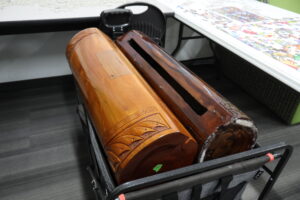2025-2026 Summer Newsletter
July 16th, 2025
Download the Summer Newsletter PDF (Spanish) Download the Summer Newsletter PDF Page...
Songs can last longer than a memory; through music, we replay memories and awaken histories. No one knows that more than our Provo High School People of Pacific (POP) students and teacher, Maka Aulava, and his students carry the tradition through their PoP class.
During my visit to Aulava’s classroom, students practiced music using personal ukeleles and an array of other instruments from around the room. For example, Aulava had his own guitar and ukelele, but he also had a bass drum (which they used that day) and a collection of Toere(s) from Tahiti (a percussive drum made from a carved log) in his room for group usage.

Lyrics and chord charts covered the whiteboard. Aulava introduced students to the second section in a newer song titled “Fa’ari’i Mai Na,” a contemporary Tahitian song. The song’s creator worked at the airport when he wrote the song. He welcomed tourists by singing and giving away leis as they landed. It’s a song to welcome visitors with open arms, expressing love for new friends.
Fa’ari’i mai na // ki to matou aronga
‘e te here é é é // te i te o te ra te na
haere mai na
a’ari’i mai te // tapa’o aronga
fa’ari’i mai ki to // hei tiare here é é é
maeva e manava ia ora
e haere mai na
Fa’ar’i mai na ki to hei tiare
‘e te here é é é // te i te a te o te ra te na
haere mai na
Receive our salutations and our love. Hello and welcome
Receive our salutations. Receive this “lei” of flowers as a sign of our love
Hello and welcome!
Students were a little timid to sing, which makes sense given their unexpected visitor (truthfully, I would have been equally uneasy as a high school student). Aulava stopped their singing to coach them.
“I hear how you sing on the bus back from your games—sing like that. These songs actually matter. They’re about you. So sing.”
Students regathered themselves and continued singing their next song, “Lo Ta Nu’u,” the unofficial anthem of American Samoa. Sung in Samoan, the song depicts pride in their culture and people. It’s a song that reminds the singer that no matter where one may be, their love for their island and their many home-given gifts extend beyond its shores.
— Samoana, (Samoana) // People of Samoa
Ala mai, (Ala mai) // Arise (wake up)
Fai ai nei, (Fai ai nei) // Give (now)
Le fa’afetai, (Le fa’afetai) // Your thanksgiving
I le pule, ua mau ai // To the Most High, who gave you
O lou nu’u, i le vasa // Your island/country, here in the ocean
Students picked up where they left off from their previous practices, reviewing chord structures, strumming patterns, and harmonies.
They finished their song practice with a Fijian song, “Noqu Masu,” or My Prayer– and, if you watch Fiji rugby and follow the Bati team, you’re likely well acquainted with the song. It’s a song of praise. According to an article at The Fiji Sun, the team adopted the song, disarding their traditional war cry of ‘Quruquru Vatu,’ which is usually performed before the start of a Test match. Instead, the team opted to sing the hymn, reflecting a love for their religion and their country. To quote the team’s captain at the time, Wes Naiqama:
“We are using our platform to proclaim our faith in the Lord and it has captured the public but moreover it has impacted people’s lives as well. It feels so good when looking at social media, people from all different countries, from all different works of life are getting to know the hymn. It has been amazing.”
Oqo na noqu masu // This is my prayer
Ka niu sa gadreva // That I am yearning for
Meu seretaka yawa // So I can praise your name further
…
Gagadre ni yaloqu // The petitions of my spirit
Au mai tagica tu // I cry them to you
Haleluya // Hallelujah
All of the songs above ask those who have received gifts from their home to take action and express gratitude for their country and forefathers who paved the way for them. They ask the speakers to care for others and invite them into their homes with open arms. It exemplifies the many Polynesian cultures that believe in giving back to those who came before you and preparing the way for those yet to come.
Whether to recount history, celebrate one another during gatherings, or for entertainment, Polynesian people have raised their voices and lifted spirits through music. Similarly, Provo High’s People of the Pacific class is a meditation about goodwill, gratitude, and action. Students are directed to learn from and care for their elders, as well as to share their knowledge with youth with open arms, no matter their background.
In that spirit, we thank Maka Aulava for building a home for our Polynesian students and the PoP class youth by representing their cultures—both as Polynesians and as community members of our Provo schools—as they uplift their peers and create safe spaces for the youth to come.
Download the Summer Newsletter PDF (Spanish) Download the Summer Newsletter PDF Page...
Provo City School District is doing a Truth in Taxation hearing on August 12, 2025 at 7:00 PM at...
March 12 Asst 4 Custodial/Team Leader: Timpview High School March 13 Inst Asst 3/Extra...